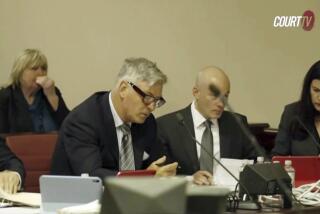Judge Gives Pep Talk on Dally Trial to Jury Pool
- Share via
SANTA BARBARA — Different defendant. Different judge. But the message delivered to about 500 prospective jurors Monday sounded almost exactly like the one offered seven months ago in the trial of convicted murderer Diana Haun.
Borrowing heavily from his predecessor, Ventura County Superior Court Judge Charles W. Campbell Jr. urged potential jurors to embrace the prospect of serving during co-defendant Michael Dally’s trial. This despite the fact that it will require jurors to be bused daily to the Ventura courthouse for what is expected to be at least a two-month trial.
“This is going to be a unique experience . . . sort of an adventure,” Campbell said, repeating a phrase used by Judge Frederick A. Jones during jury selection for Haun’s trial last summer.
As in her case, a jury made up of Santa Barbara County residents is being sought for Dally’s trial on murder, kidnapping and conspiracy charges because of heavy pretrial publicity in Ventura County.
In a short speech before prospective jurors, Campbell explained that because of a shortage of courtroom space in Santa Barbara, the jury would be bused to Ventura. He also indicated that this process would place less of a burden on the up to 200 witnesses who may be called to testify.
Many potential jurors gasped when the judge warned that the trial could stretch into next April.
“I am hopeful that those of you who are ultimately selected will find this a worthwhile experience and an interesting case,” said Campbell.
For the prospective jurors who turned out Monday morning, the adventure began early.
Due to a lack of parking, some jury candidates had to be shuttled by bus nearly two miles to a county school auditorium where Campbell made his opening remarks. A series of bright green signs led others to the vast assembly room.
Prospective panelists were then asked to complete a 16-page questionnaire probing their views on the death penalty, knowledge of the case and personal background, including any prior experiences with infidelity or drug use.
During Monday’s out-of-court session, Dally sat between his two lawyers dressed in a gray sports jacket, a tie and dark pants. He listened attentively as the judge outlined the charges, to which the 37-year-old grocery clerk has pleaded not guilty.
Because of the lack of security at the school site, four sheriff’s deputies stood nearby, and the defendant’s movements were restrained by a leg brace not visible to the audience.
Dally is facing murder and other charges for allegedly masterminding the fatal stabbing of his wife, Sherri. Prosecutors say he conspired with Haun, his former lover, to kidnap and kill the 35-year-old homemaker last year.
Sherri Dally was reported missing May 6, 1996, and 26 days later her remains were found in a steep ravine north of Ventura.
In his address, Campbell told prospective jurors that Haun was found guilty in September 1997. But he did not specify to what charges or provide any information about her six-week trial.
Campbell also explained that pretrial publicity--starting at the time of Sherri Dally’s disappearance and continuing through the present trial--has made it highly unlikely that a Ventura County jury could fairly decide the case.
“The abduction of Sherri Dally and the search for her remains . . . the discovery of those remains and the ensuing investigation and the progress of this case through the court system has generated an interest that is unprecedented,” Campbell said in remarks criticizing the media.
“They have jeopardized the rights of the people and the defendant to get a fair trial in this case in Ventura County,” he said.
Because the district attorney is seeking the death penalty in the case, jury selection will take longer than in most criminal cases, Campbell said. It took about four weeks to assemble the jury in Haun’s trial.
Monday’s orientation marks the first step in that process. Later this week, the judge will address requests from prospective jurors to be excused for financial or personal hardships.
Beginning Jan. 12, jury candidates will be asked to return for individual interviews about their views on the death penalty. Finally, in late January, the selection process will enter its final stage when 12 regular and six alternate jurors will be seated.
Campbell said testimony should begin Feb. 2.
More to Read
Sign up for Essential California
The most important California stories and recommendations in your inbox every morning.
You may occasionally receive promotional content from the Los Angeles Times.













